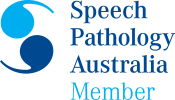When visiting a speech pathologist for the first time, as you might guess, one of the first questions your clinician will ask you is what the reason for the visit is. If you are seeing fluency or stuttering specialist, then your concern will most likely be due to a stutter that you or your child has. The stutter is often one that has been present since you or your child started talking however, we do sometimes see stuttering arise in patients with Parkinson’s disease or other neurological aetiologies. Once you have established what your concerns are, there are a few key components that the assessment is composed of, including:
Case History
This includes any background history such as the initial occurrence of the stutter, any family history of stuttering, information about when the stutter is best or worst, as may people stutter more when speaking in front of unfamiliar listeners or when their emotions are heightened (when they are angry or nervous).
Baseline stuttering data
Once the case history has been taken, your clinician will then determine the types of stuttering present in your speech. This may include repetition of words, phrases or sentences, prolongation of sounds or blocks, which are breaks in speech where the mouth opens however, no sound is produced. More severe stutters can also include superfluous non-verbal behaviours such as tics, blinking and facial grimacing. Severity is also rated either on a scale associated with the chosen method of therapy such as the Lidcombe program severity scale or using percentage of syllables stuttered (%SS). These measures are often taken to serve as a baseline to help measure progress over time. Measures should be taken in everyday activities that you are most likely to engage in. This could include reading a newspaper article aloud or during a conversation with your speech pathologist.
After the assessment has been completed, your speech pathologist will provide you with the results, which will include a diagnosis and education about stuttering and the treatment programs available. Each diagnosis is different and based on the individuals presenting symptoms, which guide the type of therapy provided. For this reason, it is essential that your stuttering be assessed properly by a qualified speech therapist prior to commencing therapy.
Contact us for results focused on speech therapy
This article was written by our Speech Pathologist Ashleigh Fattah who is a Speech Pathology Australia member. If you have speech pathology related questions, make an appointment. We‘ll provide you with simple and effective therapy targeted to your concerns. Contact us today.
The post What to expect in an initial stuttering speech pathology assessment appeared first on ENT Wellbeing Sydney.










